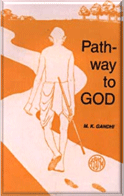
P.O. SEVAGRAM, DIST.WARDHA 442102, MS, INDIA. Phone: 91-7152-284753
FOUNDED BY MAHATMA GANDHI IN 1936
Pathway To God

PATHWAY TO GOD
Written by :
M. K. Gandhi
Compiled by :
M. S. Deshpande
Table of Contents
- PART I : INTELLECTUAL SADHANA
- PART II : MORAL SADHANA
- Truth
- Love ( Ahimsa )
- Self-Restraint
- Selfless Service
- PART III : SPIRITUAL SADHANA
- Faith
- Prayer
- Meditation (Ramanama)
- Dedication (Self-Surrender)
- PART IV : SPIRITUAL EXPERIENCE
About This Book
Written by :M. K. Gandhi
Compiled by : M. S. Deshpande
First Edition : 2,000 copies, 1971
Total : 16,000 copies
I.S.B.N :81-7229-167-1
Printed and Published by :
Navajivan Mudranalaya,
Ahmedabad - 380 014,
India.
© Navajivan Trust, 1971
Download
PART II : MORAL SADHANA
Chapter-6: Self-restraint
(1) Restraint Should Be Voluntary
Restraint self-imposed is not compulsion. A man who chooses the path of
freedom from restraint, i.e. self-indulgence, will be a bondslave of
passions, whilst a man who binds himself to rules and restraints,
releases himself. All things in the universe including the sun and the
moon and the stars — obey certain laws. Without the restraining
influence of these laws, the world would not go on for a single moment.
... It is discipline and restraint that separates us from the brute. If
we would be men walking with our heads erect and not walking on all
fours, let us understand and put ourselves under voluntary discipline
and restraint.
(2) Control of Palate
True happiness is impossible without true health and true health is
impossible without a rigid control of the palate. All the other senses
will automatically come under our control when the palate has been
brought under control. And he who has conquered his senses has really
conquered the whole world.
One should eat not in order to please the palate but just to keep the body
going. When each organ of sense subserves the body and through the body
the soul, its specific relish disappears and then alone does it begin to
function in the way nature intended it to do. Any number of experiments
is too small and no sacrifice too great for attaining this symphony with
nature.
(3) Conquest of Lust
The conquest of lust is the highest endeavour of man or woman's existence.
Without overcoming lust man cannot hope to rule over self. And without
rule over self there can be no Swaraj or Ramaraj. Rule of all without
rule of oneself would prove to be as deceptive and disappointing as a
painted toy-mango, charming to look at outwardly, but hollow and empty
within... Great causes... call for spiritual effort or soul- force.
Soul-force comes only through God's grace, and God's grace never
descends upon a man who is a slave to lust.
Brahmacharya means control of all organs of sense. He who attempts to control only
one organ and allows all others free play, is bound to find his effort
futile. To hear suggestive stories with ears, to see suggestive sights
with the eyes, to taste stimulating food with the tongue, to touch
exciting things with the hands and then at the same time, try to control
the only remaining organ, is like putting one's hand in fire and then
trying to escape being burnt. ... If we practise simultaneous
self-control in all directions, the attempt is scientific and easy of
success. Perhaps the palate is the chief sinner. Hence we have assigned
to its control, a separate place among the observances.
(4) Sublimation of Vitality
All power comes from the observation and sublimation of the vitality that is
responsible for the creation of life. If the vitality is husbanded
instead of being dissipated, it is transmuted into creative energy of
the highest order. . . . This vitality is . . . dissipated by evil . . .
thoughts. And since thought is the root of all speech and action, the
quality of the latter corresponds to that of the former. Hence perfectly
controlled thought is itself a power, of the highest potency and can
become self-acting. . . . Such power is impossible in one who dissipates
his energy . . . even as steam kept in a leaking pot yields no power.
(5) Restraint vs. Suppression
It is harmful to suppress the body if the mind at the same time is allowed
to go astray. Where the mind wanders, the body must follow sooner or
later. It is necessary here to appreciate one distinction. It is one
thing to allow the mind to harbour impure thoughts, it is different
thing altogether if it strays among them in spite of ourselves. Victory
will be ours in the end, if we non-co-operate with the mind in this evil
process. . . . Hence the body must be immediately taken in hand and then
we must put forth a constant endeavour to bring the mind under control.
We can do nothing more, nothing less.
Restraint never ruins one's health. What ruins one's health is not
restraint but outward suppression. A really self-restrained person grows
every day from strength to strength and from peace to more peace. The
very first step in self-restraint is the restraint of thoughts.
Understand your limitations and do only as much as you can. . . . Let
not what I have told you alarm you or weaken you. Always aim at
complete harmony of thought and word and deed. Always aim at purifying
your thoughts and everything will be well. There is nothing potent than
thought, deed follows word and word follows thought. The world is the
result of a mighty thought, and where the thought is mighty and pure,
the result is always mighty and pure.